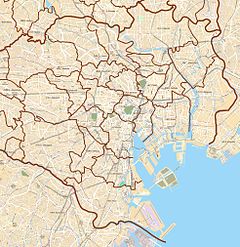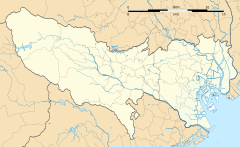Mejiro Station
35°43′16″N 139°42′25″E / 35.720995°N 139.706880°E
JY14 Mejiro Station 目白駅 | |||||||||||
|---|---|---|---|---|---|---|---|---|---|---|---|
 Mejiro Station in August 2019 | |||||||||||
| General information | |||||||||||
| Location | 3 Mejiro, Toshima City, Tokyo Japan | ||||||||||
| Operated by | |||||||||||
| Line(s) | JY Yamanote Line | ||||||||||
| Platforms | 1 island platform | ||||||||||
| Tracks | 2 | ||||||||||
| Connections | |||||||||||
| Construction | |||||||||||
| Structure type | At grade | ||||||||||
| Other information | |||||||||||
| Station code | JY14 | ||||||||||
| History | |||||||||||
| Opened | 16 March 1885 | ||||||||||
| Passengers | |||||||||||
| FY2012 | 37,684 daily | ||||||||||
| Services | |||||||||||
| |||||||||||
| |||||||||||
Mejiro Station (目白駅, Mejiro-eki) is a railway station on the Yamanote Line in Toshima, Tokyo, Japan, operated by the East Japan Railway Company (JR East).
Lines
[edit]Mejiro Station is served by the circular Yamanote Line. It is one of only two stations on the Yamanote Line that does not provide a direct connection to any other line, the other being Shin-Ōkubo.
Station layout
[edit]Mejiro Station has one island platform serving two tracks. The station building is located above the tracks, and accessibility to and from the platforms is provided by escalators as well as lifts. There are several small shops and a bakery/cafe within the station.
Platform edge doors were installed and brought into use from 9 November 2013.[1]
Platforms
[edit]| 1 | JY Yamanote Line | for Shinjuku, Shibuya, and Shinagawa |
| 2 | JY Yamanote Line | for Ikebukuro, Nippori, and Ueno |
-
Station platforms, 2014
History
[edit]The station opened on 16 March 1885.
Station numbering was introduced in 2016 with Mejiro being assigned station number JY14.[2][3]
Passenger statistics
[edit]In fiscal 2012, the station was used by an average of 37,684 passengers daily (boarding passengers only).[4] The passenger figures for previous years are as shown below.
| Fiscal year | Daily average |
|---|---|
| 2000 | 39,505[5] |
| 2005 | 39,065[6] |
| 2010 | 37,568[7] |
| 2011 | 37,355[8] |
| 2012 | 37,684[4] |
Surrounding area
[edit]Mejiro is one of the Yamanote Line's smaller stations, situated between the bustling Ikebukuro and the relatively quiet Takadanobaba.
Mejiro Station has only one exit. The ticket gate emerges onto Mejiro-dori with the co-ed campus of Gakushuin University and the Mejiro Elementary School to the right, and a busy row of shops and restaurants to the left. Just off Mejiro-dori, the wealthy area becomes residential and quite peaceful. The streets to the west, away from the Yamanote loop, feature a mix of typical apartment buildings spanning a few decades, and some very opulent designer houses with luxury vehicles in their garages.
By looking straight ahead from Mejiro Station's main exit, one can see well into the distance toward Ikebukuro's monument-like garbage processing center and the towering Sunshine 60 building.
When inside Mejiro Station, if you stand at the southernmost part, you can see Takadanobaba Station.
See also
[edit]References
[edit]- ^ 山手線目白駅で可動式ホーム柵の使用開始 [Platform edge doors brought into use at Mejiro Station on Yamanote Line]. Japan Railfan Magazine Online (in Japanese). Japan: Koyusha Co., Ltd. 10 November 2013. Retrieved 11 November 2013.
- ^ "⾸都圏エリアへ 「駅ナンバリング」を導⼊します" [Introduce “station numbering” to the Tokyo metropolitan area] (PDF). jreast.co.jp (in Japanese). 6 April 2016. Archived from the original (PDF) on 7 December 2022. Retrieved 7 January 2023.
- ^ Kusamachi, Yoshikazu (7 April 2016). "JA・JK・JT・AKB…JR東日本、首都圏で駅ナンバリングなど導入へ" [JA, JK, JT, AKB … JR East to introduce station numbering in the Tokyo metropolitan area]. Response Automotive Media (in Japanese). Archived from the original on 6 August 2022. Retrieved 7 January 2023.
- ^ a b 各駅の乗車人員 (2012年度) [Station passenger figures (Fiscal 2012)] (in Japanese). Japan: East Japan Railway Company. Retrieved 11 November 2013.
- ^ 各駅の乗車人員 (2000年度) [Station passenger figures (Fiscal 2000)] (in Japanese). Japan: East Japan Railway Company. Retrieved 11 November 2013.
- ^ 各駅の乗車人員 (2005年度) [Station passenger figures (Fiscal 2005)] (in Japanese). Japan: East Japan Railway Company. Retrieved 11 November 2013.
- ^ 各駅の乗車人員 (2010年度) [Station passenger figures (Fiscal 2010)] (in Japanese). Japan: East Japan Railway Company. Retrieved 11 November 2013.
- ^ 各駅の乗車人員 (2011年度) [Station passenger figures (Fiscal 2011)] (in Japanese). Japan: East Japan Railway Company. Retrieved 11 November 2013.
External links
[edit]- JR East station information (in Japanese)





